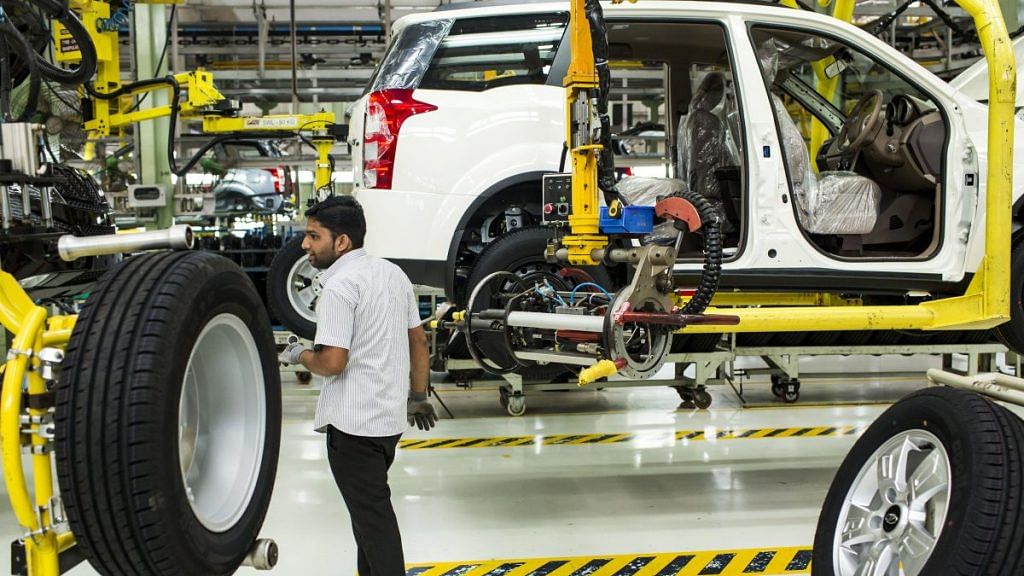Is it just me or is the economy facing a slowdown?” asks an entrepreneur friend. It’s curious how little debate, discussion, noise or anxiety there is about the state of India’s economy.
This slowdown is worrisome because it comes from a domestic consumption slowdown, not just from global factors such as rising oil prices. People not consuming enough will mean lower production, which will mean even fewer jobs in a country with a 45-year-high unemployment rate. There can’t be a better indicator of the economy than passenger vehicle sales, which are down by over 20 per cent since last year, and worse may be yet to come.
Make no mistake, this is the most important issue facing India, but you wouldn’t feel that if you followed the national public discourse. Denial is the name of a river in India.
Also read: Goal to make India a $5 trillion economy by 2024 challenging but achievable: PM Modi
A poor, developing country, India needs a very high rate of economic growth to make sure its children don’t go to sleep hungry, they get good education, people get good healthcare, and still have enough disposable income to be happy. Such happiness needs jobs, which needs investment, which needs consumer demand.
The mood of consumers in the economy turned pessimistic around the same time as Indians gave Narendra Modi a thumping mandate last month, bigger than 2014. This paradox isn’t all that inexplicable if you consider the old saying that good economics doesn’t make good politics. This is proof that Modi won the election not because people thought he was great but because they thought the opposition was worse.
Also read: Caught in a slowdown, India’s auto sector sees no hope for growth until festival season
No one left to speak
Modi’s mastery over politics has made sure that development and elections have been de-linked. Oh vikas, we miss thee. Modi’s 2014 election was all about vikas. A limping opposition was unable to make the 2019 election about vikas. As a result, vikas has vanished. Where did vikas go? No one knows. The media could find out perhaps, but it’s too afraid of being called Khan Market gang.
The media and the opposition are supposed to raise uncomfortable questions that the Modi government would rather avoid. The media and the opposition alike are showing no sense of urgency. They don’t seem to care that the government’s own former chief economic adviser has estimated that India’s real economic growth between 2011-12 and 2016-17 was actually 4.5 per cent, the rest 2.5 per cent in the government estimate was bad data. Under ordinary circumstances, this revelation should have been a huge scandal. The opposition should have been screaming blue murder.
Elections over, and the Narendra Modi government officially adopted a report that said India’s unemployment rate is at a 45-year high. Before the elections, as the report was leaked against government efforts to suppress it, the government had rejected its findings. Then finance minister Arun Jaitley had said these numbers couldn’t be true because if they were, there would be street protests.
We saw many street protests over the last five years from farmers and caste groups seeking reservations. These were indirectly about unemployment. But a comatose opposition is unable to give political voice to such sentiments. And a co-opted media just won’t.
Also read: Modi’s suspect GDP numbers have done real damage to India’s economy
Is it really a democracy when people’s issues don’t seem to matter and the ruling party keeps winning elections on auto-pilot? Democracy is when a people ask the most uncomfortable questions. It is only in authoritarian regimes where the government pretends all is well and nobody dares question the government’s claims. So, are we really a democracy anymore?
If India Inc. is worried, it should know the price of cowardice is high. India Inc. has been a mute spectator as the government made one bad policy decision after another over the last five years. After everyone has sealed their lips for fear of government reprisal, there will be no one left to speak.
Also read: RBI to the rescue – Modi govt eyes bank’s Rs 9.6 trillion surplus to beat economy blues
Deflect and rule
Even if we go by the government’s questionable data, India is no longer the world’s fastest-growing large economy. Where did we go wrong? Before we can even ask that question, Narendra Modi will draw our attention elsewhere. Over the last five years, we have seen his masterful use of Deflect and Rule. The government, through its ‘ecosystem’ in social and mainstream media, will make sure we talk about Hindu-Muslim issues, labelling people patriots and anti-national, fighting for basic decency in public life.
The ruling party will make sure it heckles Asaduddin Owaisi with chants of Jai Shri Ram, because insulting a Muslim man with religious majoritarianism will help deflect attention from the nosediving numbers of the economy.
Before you could ask what the government is doing to make private investment pick up, they will create controversy through Godse-loving Pragya Thakur.
Before you could ask what the government is doing to halt the decline in the auto sector, they will shift the political discourse to the hare-brained idea of ‘one nation, one election’. We already have ‘one nation, one GDP’ and it’s going south, but let’s discuss if we can make the BJP win state and central elections together.
The Modi government right now must be spending less time preparing the July Budget and more time coming up with red herrings to counter future bad news on the economic front. As a structural slowdown stares us in the face, all we’ll be left with is Jai Shri Ram.
Views are personal.
